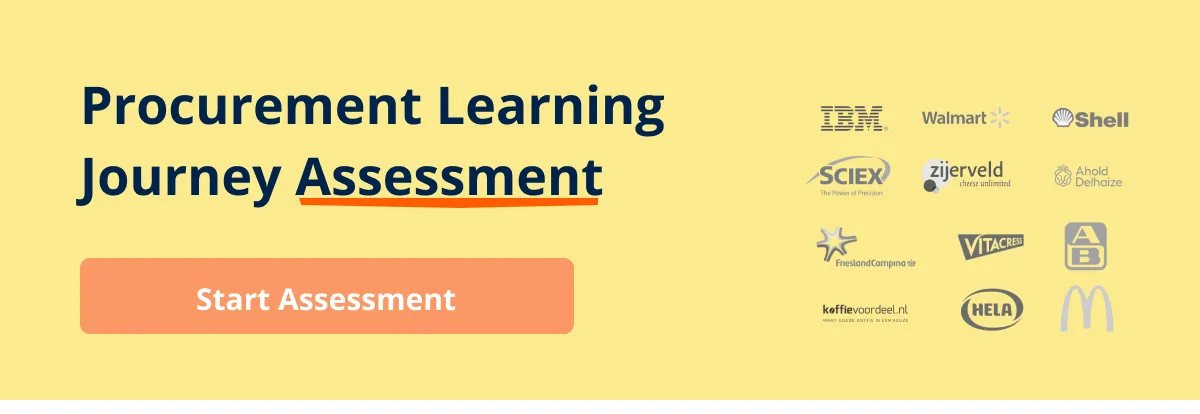ChatGPT & AI in
Procurement Course
Free Preview Lesson

Written by Marijn Overvest | Reviewed by Sjoerd Goedhart | Fact Checked by Ruud Emonds | Our editorial policy
Retail Supply Chain 2024: Strategies + Personal Case Study
Key take-aways
- The production and distribution processes of the retail supply chain include such activities as procurement, order management, inventory management, warehousing, and others.
- Retail supply chain management emphasizes efficiency and cost-effectiveness in logistics operations starting from raw material procurement to customer delivery.
- The significance of retail supply chain management is highlighted by consumer expectations of fast delivery and free shipping among others.
Retail supply chains around the world are under intense pressure due to global disruptions. However, what is the retail supply chain?
This article will discuss what a retail supply chain is. We will also tackle retail supply chain management and its importance. Additionally, we will give you an example of a retail supply chain and how to improve your retail supply chain management amidst the challenges.
Once you finish reading this article, you will have a deeper understanding of the retail supply chain. Thus, this will allow you to implement the knowledge you learn from here in your company or profession.
The Meaning of Retail Supply Chain
Many people have an idea of what a retail supply chain is due to the word “retail”. When we say retail, it is the sale of goods and services to consumers. Therefore, if we combine it with the supply chain, we know that it is inclined with how a product moves.
The retail supply chain is the flow of processes that involves the production and distribution of a company’s products. Various discrete elements of the supply chain include procurement, order management, inventory management, warehousing, carrier partnerships, and more.
To simplify the retail supply chain, many companies refer to it as the logistics processes that enable the product to reach the end customers. It encompasses everything from acquiring the raw materials you need to make the product to delivering that product to your customers.
What is Retail Supply Chain Management?
Retail supply chain management ensures that the logistics operations of a business are optimized throughout the supply chain, from obtaining raw materials to delivering them to customers in the product cycle.
Additionally, it refers to how managers handle inbound and outbound logistics of goods. Supply chain managers optimize supply-side processes to cut costs, deliver products faster, and gain a competitive advantage in the market against other businesses.
Through retail supply chain management, processes are streamlined to maximize speed and efficiency. You need to deliver the products to your customers quickly to satisfy them. However, you do not want to pay too much only to do that. Thus, optimizing your processes is the key to being cost-efficient in managing them.
The Importance of Retail Supply Chain Management
Many people overlook the importance of retail supply chain management and undervalue its impact on business operations. However, retailers cannot do it anymore nowadays.
According to a report by the National Retail Federation (NRF), almost 65% of consumers look up free-shipping thresholds before adding items to their online shopping carts.
Additionally, 39% of the consumers surveyed expect two-day shipping to be free of charge. If you do not offer this, consumers will try finding other online shops. Also, 29% of consumers opt not to buy anymore if they know that two-day shipping is not free.
Many retailers are falling short of meeting the customer’s expectations. Those businesses that can provide the best shipping experience will see a big impact on their costs and gain some advantage over other competitors.
For you to stand out in the retail industry, your fulfillment process and ability to deliver the products can set you apart from the others in the competition.
My Experience in Retail Supply Chain
“In my period as Procurement Manager for Ahold Delhaize, I learned that there is a strong link between the performance of buyers and the supply chain. The better the two departments work together, the better the result for the company! The lessons I learned this year in helping many companies in improving their procurement and supply chain teams & processes, confirmed this. In my opinion, both departments should work closely together to achieve targets. To work together as closely as possible, I had a weekly meeting with my supply chain manager every week to discuss subjects like:
- Supplier performance last week
- Outlook next week
- Which products are not available to deliver and why?
- Outlook coming 3 months
As a procurement manager, I pushed the supply chain team to always be in the lead of supplier escalation in case our standards were not met. If suppliers were not able to deliver products, I first let the Supply chain Manager contact them. I, as a negotiator, wanted to be an escalation possibility.
Examples of what I did with my Supply Chain manager together are:
- Visiting suppliers
- Quarterly review with large suppliers
- Set targets for next year and communicate those to suppliers
- Made promotion outlook
Challenges in The Retail Supply Chain
Here are some challenges within the retail supply chain.
1. Worldwide Shortages
Worldwide shortages disrupted every element of the supply chain due to the pandemic, the ongoing war between Ukraine and Russia, and other trade disputes.
Shortages are now getting worse and everyone is affected, not just retailers. Thus, making it hard to get the necessary supplies and inventory.
2. Shipping Congestion
Retailers are facing shipping congestion in major ports due to what is happening in the world today. The long delays are increasing shipping times and creating longer wait times to unload the cargo at the ports despite handling fewer cargoes.
The active container shipping supply has also decreased due to the shipping congestion. Thus, it removed about 16% of global container ship sailing capacity compared to the last two years.
3. Economic Sanctions
Economic sanctions had strained the speed of supply chains. Many countries continue to issue sanctions against Russia. Russia retaliates by also issuing sanctions against them. Therefore, there have been many changes in terms of trade among countries.
The sanctions between nations are not slowing down and are expected to continue further. Thus, affecting many business operations in the coming months and years.
How to Improve the Retail Supply Chain Management
You may be interested to know how to improve the retail supply chain management.
1. Implementing Retail Systems
Implementing a good supply chain system can oversee the entire production process, from obtaining raw goods to manufacturing and sending them to customers. You will have a high chance of a successful supply chain by integrating retail systems.
Additionally, you will get real-time visibility into all areas of your business. You can also avoid overselling stock and spend less time reconciling your inventory.
2. Enhancing the accuracy of forecasting
Demand forecasting can help know what products consumers will buy and projects your future revenue. It will also help you make decisions about your product offerings and inventory, decreasing stockouts and maintaining your cash flow.
3. Applying reverse logistics
Processes like recycling or returns require reverse logistics. Reverse logistics helps you to regain value from your products or dispose of them. Due to the fact that returns harm your profitability, and most customers say that they will not shop with businesses with poor returns, reverse logistics is a significant process to get it right.
Trends in Retail Supply Chain
Here are some trends in the retail supply chain that you may want to know.
1. Faster customer returns and refunds
For 2024, retailers and brands will focus on making the process of customer returns much faster and slicker than before.
This is due to the fact that consumers are more likely to shop and respond with a retailer following a return if they get their money back fast.
Additionally, according to a study conducted by the ASCG, almost 51% of consumers will spend between £50 to £200 less each month due to rising energy bills and the impacts of inflation.
Thus, quick returns and refund processes could help retailers lock in sales by ensuring that an item being sent back does not mark the end of the buyer’s transaction.
2. Lowering international freight prices
Shipping prices during the past few years have been a big priority for retailers. Attention to finding ways to mitigate costs, alternative route planning, and international freight prices are showing downward trends as we return to pre-pandemic levels.
3. Outsourced warehousing
Warehouses are a big expense for retailers, whether rented or owned, which is a major reason why we will likely see a shift to outsourced warehousing in 2024.
Additionally, retailers are keen to lower their operating costs and strengthen their cash flow as they adjust their operating models. Thus, warehousing ranks as the top priority for retailers looking to lower their costs to protect their profit margins in 2024.
Conclusion
Understanding and effectively managing the retail supply chain is crucial for businesses to meet consumer expectations, navigate challenges, and stay competitive. Implementing efficient systems, accurate forecasting, and adapting to emerging trends contribute to a resilient and successful retail supply chain.
Frequentlyasked questions
What is a retail supply chain?
It is a logistics process that allows the products to reach the customers.
What is retail supply chain management?
It is the process that ensures the management of outbound and inbound logistics of goods.
Why is it important?
It is important due to the increasing demand and expectations of customers that companies need to address.
About the author
My name is Marijn Overvest, I’m the founder of Procurement Tactics. I have a deep passion for procurement, and I’ve upskilled over 200 procurement teams from all over the world. When I’m not working, I love running and cycling.


